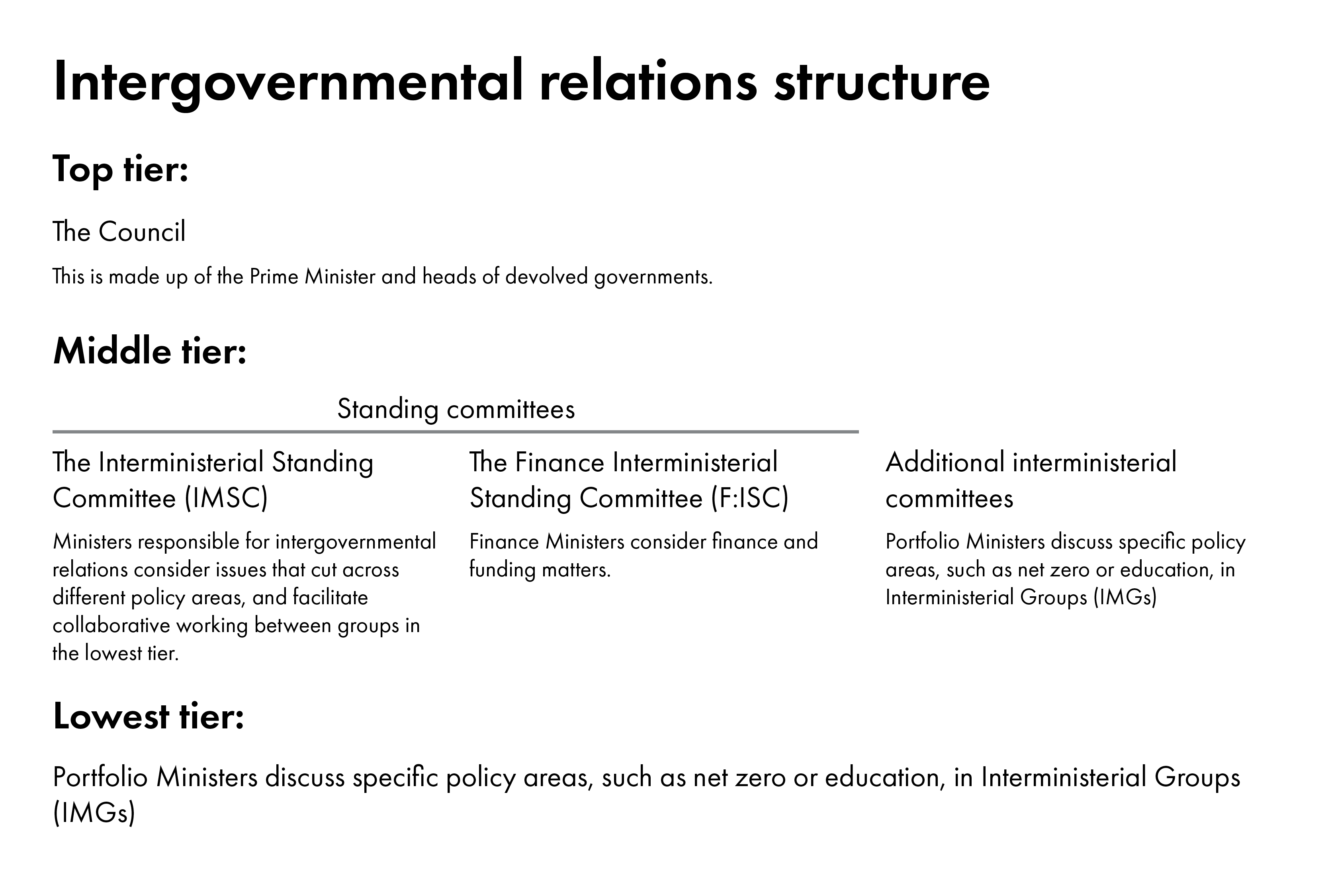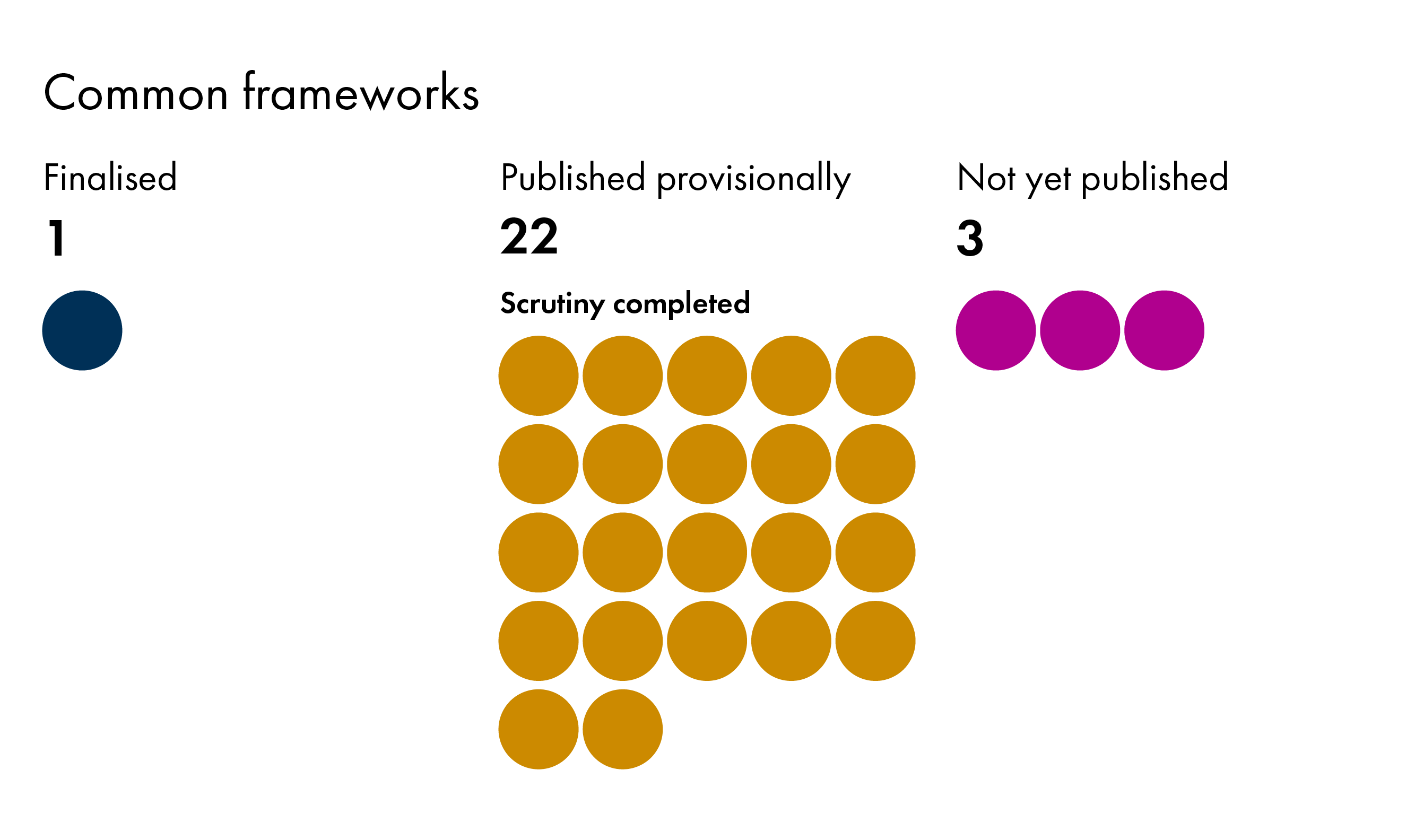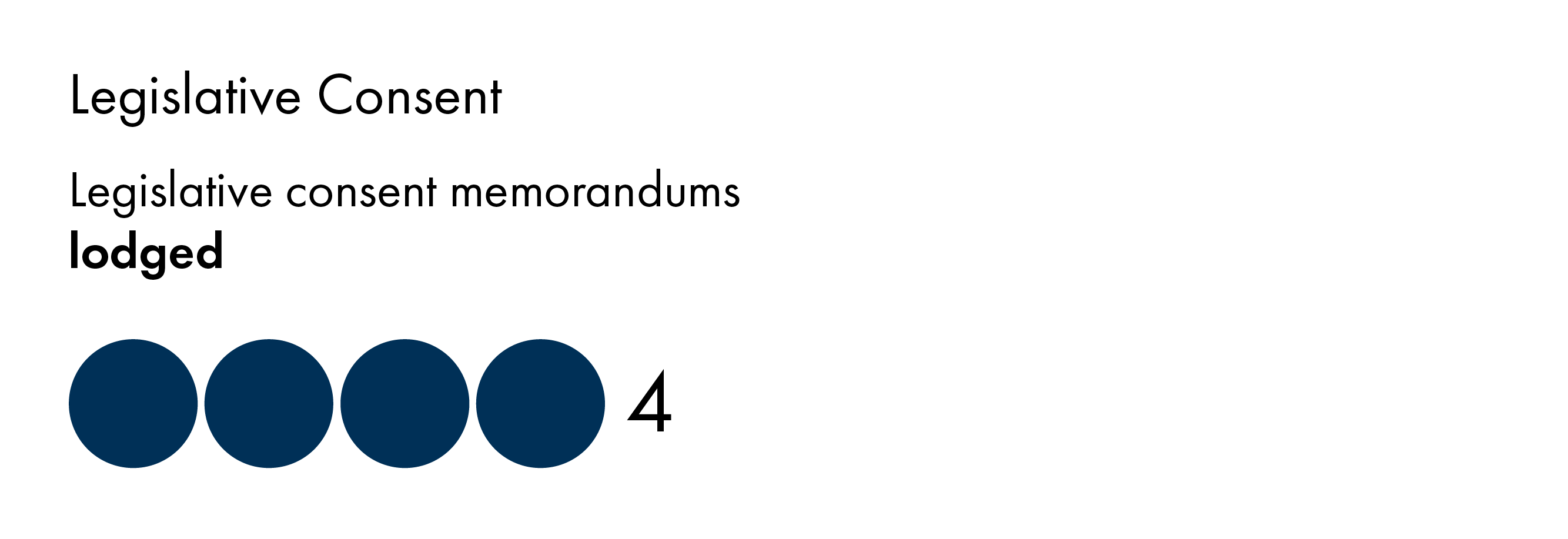Intergovernmental activity update Q3 2024
This update gives an overview of intergovernmental activity of relevance to the Scottish Parliament between the Scottish Government and the UK Government, the Welsh Government, and the Northern Ireland Executive during quarter three (July-September) of 2024.
Introduction
SPICe publishes quarterly updates to give an overview of intergovernmental activity. 'Intergovernmental activity’ refers to work between governments – in a Scottish context between the Scottish Government and the UK Government or other devolved governments. It can include discussions on areas of mutual interest, policy development, and policy implementation. Read more about what intergovernmental activity is and why awareness of it is an essential element of parliamentary scrutiny on our SPICe blog. SPICe has also launched an intergovernmental activity hub that collates information on intergovernmental activity of relevance to the Scottish Parliament.
Updates are published on the last Thursday of the month following the end of the reporting period. This update reflects information available at the time of publication.
A new Labour UK Government formed in July 2024. Commitments related to intergovernmental activity made by the Labour Party in its manifesto were summarised in the intergovernmental activity update Q2 2024. The 2024-25 session of the UK Parliament began with the State Opening of Parliament on 17 July 2024.
Highlights
.png)
Intergovernmental activity
Formal intergovernmental interactions take place under the following structure, which was established in January 2022.

See a SPICe blog for more information on how the new structure operates.
Interministerial meetings

The IMG Environment, Food and Rural Affairs met on 16 September 2024. The Cabinet Secretary for Rural Affairs, Land Reform and Islands wrote to the Net Zero, Energy and Transport Committee on 1 October 2024 to provide a summary of the meeting.
According to minutes of the meeting agreed by all four governments, Ministers agreed a 'programme of enhanced collaboration' in areas including:
enhancing joint scientific research and local field trials to identify solutions that can be applied across wider geographical regions, starting with tackling pollution of culturally and economically important water bodies and sharing respective flood resilience strategies
reducing waste and pollution, and creating value for businesses and consumers by moving to a circular economy through initiatives such as Deposit Return Schemes introduced across the four nations and Extended Producer Responsibility measures
improving food security and environmental land management by increasing the exchange of data and insights of farming support schemes
enhancing biosecurity and reducing barriers to trade by resetting our relationship with the EU, including addressing matters arising under the Border Target Operating Model and seeking to negotiate a veterinary/Sanitary and Phytosanitary agreement with the EU
halting and reversing biodiversity loss by 2030, by working together on specific domestic policy measures that will support implementation of respective national action plans, contributing to meeting the goals and targets of the Global Biodiversity Framework
scaling up private investment in nature recovery across the EFRA [Environment, Food, Rural Affairs] sectors through the development and operation of nature markets frameworks
The minutes note that "the group agreed to establish stronger intergovernmental relations based on the principles of honesty, trust and respect" and include new Terms of Reference. These list two Scottish Ministers as members of the group based on current Ministerial responsibilities: the Cabinet Secretary for Rural Affairs, Land Reform and Islands and the Cabinet Secretary for Net Zero and Energy.
In relation to hosting and frequency, the Terms of Reference state that meetings will be hosted and chaired on a rotational basis and that there will normally be be "at least 7 and up to 10 meetings per year". Before the meeting on 16 September 2024, the group had last met in September 2023. The group had previously been meeting regularly, between four and six times a year from 2021-23.
The updated Terms of Reference note that the IMG may be used as a forum for dispute resolution after they have been discussed at official level, and have been through either common framework dispute resolution and avoidance processes, or the Intergovernmental Senior Officials Group (for areas not covered by common frameworks). The Terms of Reference also note:
There will be proportionate procedures to clarify when [Department for Environment Food and Rural Affairs] is fulfilling its duties for England and for the UK, including during the dispute resolution process.
Commentators have long noted issues relating to the UK Government's role as a representative for England as well the UK as a whole.
Common frameworks
Common frameworks are intergovernmental agreements which set out how governments will work together to make decisions about policy in certain devolved policy areas, in particular decisions about policy divergence. Common frameworks were originally intended to be used to consider matters which were former EU competences, however, some also state that they may be used to consider related matters within the wider policy area. You can read more about what common frameworks are on our intergovernmental activity hub.
No new framework agreements were published during the reporting period. The image below provides an update on frameworks relevant to Scotland and scrutiny of frameworks at the Scottish Parliament.

One common framework, Hazardous Substances (Planning), has been finalised. Scrutiny of all currently provisionally published frameworks that apply to Scotland has been completed at the Scottish Parliament. Three more planned frameworks that apply to Scotland remain unpublished: the Zootechnics Framework, the Mutual Recognition of Professional Qualifications Framework, and the Services Directive Framework.
UK internal market
The UK Internal Market Act 2020 is UK-wide legislation about the flow of goods and services. You can read more about the Act's provisions in our SPICe briefing and a SPICe blog.
UK Internal Market Act exclusions
A process has been established by which the UK Government and devolved governments can consider exclusions to the market access principles of the UK Internal Market Act 2020 ('UKIMA'). Read more about the interaction between the exclusions process and common frameworks in our SPICe blog.
.png)
Deposit Return Scheme
Discussions about a UKIMA exclusion relating to a Scottish Deposit Return Scheme for drinks containers took place during 2023. The UK Government offered a temporary, narrower exclusion than the one requested by the Scottish Government, which the Scottish Government cited as the reason for its delay of the scheme until at least October 2025. See SPICe blogs for background about the scheme and further information about intergovernmental discussions regarding an exclusion. The Q1 2024 and the Q2 2024 intergovernmental activity updates summarised further developments that have taken place in 2024.
At the meeting of the IMG for Environment, Food and Rural Affairs on 16 September 2024, moving to a circular economy through initiatives such as deposit return schemes was identified as one of the areas for enhanced collaboration between the governments.
In response to a parliamentary question about whether the UK Government is planning to introduce a deposit return scheme for drinks containers before October 2027 (the date set out in a joint policy statement between the previous UK Government and devolved governments in April 2024), Parliamentary Under-Secretary (Department for Environment, Food and Rural Affairs), Mary Creagh MP, stated:
Yes. This Government is committed to creating a roadmap to a zero-waste economy – a future where we keep our resources in use for longer; waste is reduced; we accelerate the path to net zero, we see investment in critical infrastructure and green jobs; our economy prospers; and nature thrives.
We are reviewing the suite of packaging reforms and are going to work with our devolved government counterparts, industry and other stakeholders to determine the next steps for the Deposit Return Scheme. I would be happy to update the House in due course.
In a further answer to a parliamentary question, published on 10 October 2024, the Minister set out further details on the scope of the schemes for England and Northern Ireland:
The Deposit Return Scheme (DRS) for drinks containers across all four nations will include single-use drinks containers from 150ml to 3 litres.
In England and Northern Ireland, materials included in DRS are polyethylene terephthalate (PET) plastic, steel, and aluminium drink containers. Glass will not be in scope of the scheme [...]
Disposable vapes
Following a joint consultation by the Scottish Government, the UK Government and the Welsh Government at the end of 2023, the Scottish Government announced in February 2024 that it plans to ban the sale and supply of disposable vapes in Scotland from April 2025. Further background is provided in the Q2 2024 intergovernmental activity update.
The Welsh Government and UK Government also announced plans to ban disposable vapes in April 2025 and the Welsh Government consulted on draft regulations in July 2024.
The Scottish Government laid the draft Environmental Protection (Single-use Vapes) (Scotland) Regulations 2024 on 10 June 2024. The instrument was considered by the Net Zero, Energy and Transport Committee, which wrote to a group of stakeholders, took evidence on the regulations from the Scottish Government on 3 September 2024 and reported on 19 September 2024. The Committee recommended that the regulations be approved. The conclusions of the report further state:
Recognising the potential benefits of aligning policies across the four nations, particularly to combat the illicit trade in single-use vapes, the committee requests regular updates from the Scottish Government on the progress of the UK-level ban, its timeline for introduction, and any potential impacts this might have on the ban being introduced in Scotland.
The Environmental Protection (Single-use Vapes) (Scotland) Regulations 2024 were subsequently made on 1 October 2024 and are due to come into force on 1 April 2025.
The draft Environmental Protection (Single-use Vapes) (England) Regulations 2024 were laid on 23 October 2024 and are currently being considered in the UK Parliament. The regulations would ban the sale of single-use vapes from 1 June 2025 in England. A UK Government announcement states:
The UK Government and Devolved Governments have worked closely and will align coming into force dates.
The Scottish Government announced that it would delay the ban on disposable vapes in Scotland to 1 June. The Cabinet Secretary for Health and Social Care, Neil Gray MSP, stated:
We will lay regulations to amend the current coming into force date from 1 April 2025 to 1 June 2025 to ensure a common date across the four nations.
Legislative consent
According to the Sewel Convention, the UK Parliament will not normally legislate on devolved matters without the consent of the Scottish Parliament. The Scottish Parliament’s standing orders set down rules which apply where UK primary legislation requires the Parliament’s consent under the Sewel Convention. They apply where UK primary legislation makes ‘relevant provision’, which means provision which applies to Scotland in any of the following ways:
for any purpose within the legislative competence of the Scottish Parliament
to alter the legislative competence of the Scottish Parliament
to alter the executive competence of the Scottish Ministers.
When any of the criteria on relevant provision are fulfilled, a member of the Scottish Government is obliged to lodge a legislative consent memorandum. A legislative consent memorandum, amongst other things, sets out the Scottish Government's view on whether the Parliament should grant legislative consent.
Following the lodging of a legislative consent memorandum, members of the Scottish Parliament may vote on a motion on legislative consent to grant or withhold consent for the Bill.
Find out more about legislative consent on the Scottish Parliament's website.

| Bill title | Date memorandum lodged | Consent recommendation by Scottish Government |
|---|---|---|
| Product Regulation and Metrology Bill | 24 September 2024 | Consent not recommended |
| Renters' Rights Bill | 24 September 2024 | Consent recommended |
| Great British Energy Bill | 8 August 2024 | No recommendation made |
| Passenger Railway Services (Public Ownership) Bill | 1 August 2024 | Consent recommended |
Further information
Information within this intergovernmental update is primarily based on the following sources:
The UK Government intergovernmental relations website contains minutes of interministerial groups and standing committees. Minutes of other intergovernmental meetings are not currently published and hence are not reflected in this update.
The UK Government common frameworks website contains common framework agreements.
The Scottish Parliament legislative consent website lists legislative consent memorandums and associated motions.
Further information on intergovernmental activity can be found on our intergovernmental activity hub and:
House of Commons Library briefing on intergovernmental relations
UK Government transparency reports on intergovernmental relations
Senedd Legislation, Justice and Constitution Committee Monitoring reports
Northern Ireland Assembly Brexit and Beyond newsletters.